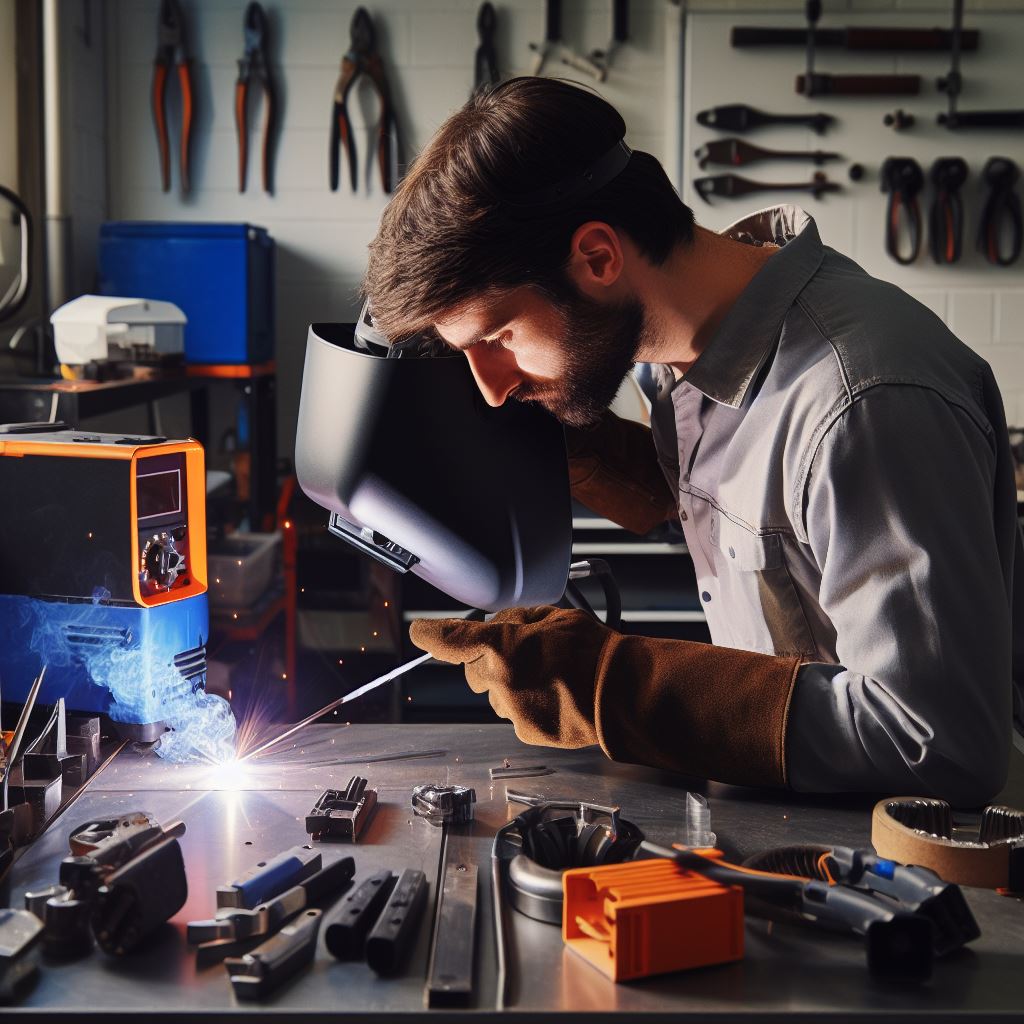Introduction
A. Electrician Tools for Beginners
Embarking on a journey in the electrical trade? Equip yourself with the right tools for success.
B. Importance of Having the Right Tools
The adage holds true for electricians: a skilled worker is only as good as their tools. Precision and efficiency demand proper equipment.
C. Purpose and Structure of the Blog Post
Get ready to dive into the essential toolkit for budding electricians.
This post unveils the must-have instruments crucial for anyone starting their electrifying career.
In this blog post, we’ll cover:
- Screwdrivers: The versatile cornerstone for various tasks.
- Voltage Tester: Ensures safety by detecting live wires.
- Pliers: Aids in gripping, bending, and cutting wires.
- Tape Measure: Precision matters; measure twice, cut once.
- Wire Strippers: Essential for safely removing insulation from wires.
- Hammer: Sometimes, a little persuasion is needed.
- Drill: For creating holes and installing electrical boxes.
- Tool Bag: Keep your arsenal organized and accessible.
Stay tuned to learn how each tool plays a pivotal role in your journey as a beginner electrician.
Basic Hand Tools
A. The importance of basic hand tools in an electrician’s toolkit
The importance of basic hand tools in an electrician’s toolkit cannot be overstated.
These tools are essential for any electrical work and play a crucial role in ensuring safety and efficiency.
B. Essential hand tools
Here are some essential hand tools that every beginner electrician should have:
1. Screwdrivers
Screwdrivers are one of the most basic tools that an electrician needs.
They come in various sizes and types, including flathead and Phillips head screwdrivers.
These tools are used for tightening or loosening screws in electrical panels, switches, outlets, and other electrical components.
2. Pliers
Pliers are another must-have tool for electricians.
They allow for a firm grip and are used to bend, twist, or cut wires.
Electricians use different types of pliers, such as needle-nose pliers for precise work and lineman’s pliers for heavy-duty tasks.
Personalized UK Career Consulting
Receive tailored career guidance designed just for you. Get actionable steps and expert support to boost your career in 1-3 days. Take control of your career now.
Get Started3. Wire Cutters
Wire cutters, also known as diagonal cutters or side cutters, are used to cut electrical wires to the desired length.
They are designed to provide a clean and precise cut, making it easier to work with the wires.
Diagonal cutters with insulated handles are essential for added safety.
4. Wire Strippers
Wire strippers are used to remove the insulation from electrical wires without damaging the conductor inside.
They come in different sizes to accommodate various wire gauges.
Properly stripped wires ensure a secure and reliable electrical connection.
C. Their specific uses and how they aid in electrical work
Each of these tools has its specific uses and contributes to the overall efficiency and safety of electrical work.
Here’s how they aid in electrical tasks:
- Screwdrivers: These tools enable electricians to securely fasten electrical components, preventing loose connections that can result in electrical hazards or malfunctions.
- Pliers: Pliers provide a strong grip, allowing electricians to manipulate and shape wires according to the specific requirements of the electrical system. They ensure proper connections and reduce the risk of loose or faulty wiring.
- Wire Cutters: Wire cutters are essential for every electrician as they enable precise cutting of wires to the required length. Accurate wire cutting ensures neat and organized electrical installations.
- Wire Strippers: By removing the insulation from electrical wires, wire strippers facilitate the connection of wires to switches, outlets, or other devices.
Properly stripped wires ensure good conductivity and reduce the risk of short circuits or electrical failures.
In addition to these basic hand tools, it is also important for beginner electricians to have a toolbox, tape measure, flashlight, voltage tester, and safety gloves.
These tools further enhance safety and efficiency while working with electricity.
To conclude, basic hand tools are indispensable for electricians.
They not only aid in various electrical tasks but also ensure safety and reliability.
Investing in high-quality hand tools is crucial for any beginner electrician looking to establish a successful career in the field.
Read: Safety Tips Every Electrician Should Follow
Your Dream Job Starts with a Perfect CV
Get a tailored CV and cover letter that captures your unique strengths and stands out in your industry. Let us help you make an unforgettable first impression.
Get StartedTesting and Measuring Tools for Electricians
A. The necessity of testing and measuring tools for electricians
When it comes to electrical work, the importance of testing and measuring tools cannot be overstated.
These tools not only ensure safety but also help electricians make accurate measurements, crucial for successful electrical installations and repairs.
B. Testing and Measuring Tools
In this section, we will discuss some of the essential testing and measuring tools that every beginner electrician must have in their toolbox.
1. Voltage Testers
- Voltage testers are used to determine whether an electrical circuit is carrying current or not.
- They help electricians identify live wires, ensuring they can safely work with the circuit.
- These testers come in various types, including non-contact voltage testers and two-lead voltage testers.
- They are easy to use and provide a quick and reliable indication of the presence of voltage.
2. Multimeters
- Multimeters are versatile tools that measure voltage, current, and resistance in electrical circuits.
- They enable electricians to troubleshoot electrical problems and diagnose issues accurately.
- These tools come with different features, such as digital displays and various measurement modes.
- They are essential for testing components, checking continuity, and performing other critical electrical measurements.
3. Circuit Analyzers
- Circuit analyzers are used to analyze and evaluate the performance of electrical circuits.
- They help electricians identify faulty wiring, overloaded circuits, and potential safety hazards.
- These tools can detect issues like electrical ground faults and incorrect wiring configurations.
- By using circuit analyzers, electricians can ensure that circuits comply with safety standards and function optimally.
C. How these tools help ensure safety and accurate measurements during electrical work
Testing and measuring tools provide several benefits to electricians:
- Enhanced Safety: These tools help electricians identify live wires and ensure they are properly de-energized before starting the work, preventing accidents and electrical shocks.
- Accurate Measurements: By using voltage testers, multimeters, and circuit analyzers, electricians can obtain precise measurements, allowing them to troubleshoot effectively and work more efficiently.
- Troubleshooting and Diagnostics: These tools help electricians identify electrical faults, locate short circuits, and troubleshoot issues quickly, reducing repair time and minimizing downtime.
- Compliance with Regulations: The use of testing and measuring tools ensures that electrical installations comply with safety regulations and local electrical codes.
As a beginner electrician, it is essential to invest in high-quality testing and measuring tools.
These tools not only make your work easier but also contribute to your safety and the quality of your electrical installations.
Remember, accurate measurements and adherence to safety guidelines are paramount in the electrical industry.
Therefore, testing and measuring tools are indispensable for electricians.
Tools like voltage testers, multimeters, and circuit analyzers play a crucial role in ensuring safety and accurate measurements during electrical work.
By utilizing these tools, electricians can work efficiently, troubleshoot effectively, and comply with electrical regulations.
Don’t underestimate the importance of these tools – they are the backbone of every successful electrician’s toolbox.
Read: UK Electrical Codes: What You Must Know
Power Tools: A Must-Have for Beginners in the Electrician’s Toolkit
A. The role of power tools in an electrician’s toolkit
Power tools play a crucial role in an electrician’s toolkit, providing efficiency, convenience, and precision in various tasks.
B. Essential tools for a beginner electrician
These tools are essential for a beginner electrician as they make the job easier and more manageable.
Optimize Your LinkedIn for Success
Boost your LinkedIn profile with a professional bio, keyword-rich headline, and strategic recommendations that attract recruiters. Stand out from the crowd and get noticed.
Optimize Now1. Drills
- Drills are indispensable for electricians as they are used for creating holes in various materials.
- Whether it’s drilling into wood, metal, or concrete, a quality drill will ensure accurate and efficient work.
- For beginners, a cordless drill with adjustable speed and torque settings is recommended.
- Starting with a basic drill and gradually investing in specialized attachments will enhance the tool’s versatility.
2. Saws
- Saws are essential for cutting materials such as pipes, conduits, and even drywall.
- A circular saw or a reciprocating saw can make precise cuts and save time compared to manual saws.
- Choosing the right blade for the specific material ensures cleaner and more efficient cuts.
- Beginners should consider purchasing a basic saw that can handle multiple tasks and gradually expand their collection with specialized saws.
3. Power Screwdrivers
- Electricians frequently work with electrical boxes, which require a multitude of screws for secure installation.
- A power screwdriver makes this task faster and less tiring, eliminating the need for manual screwdrivers.
- Investing in a screwdriver with adjustable speed settings and magnetic tips can greatly enhance productivity.
- Beginners should start with a basic power screwdriver, gradually adding different sizes and types of screwdriver bits to their collection.
In addition to these specific power tools, a beginner electrician should also consider essential accessories such as safety equipment, measuring tools, and tool bags for convenient transportation.
4. Safety Equipment
- Electricians deal with potentially hazardous situations, so safety should be a top priority.
- Investing in proper safety gear, including gloves, goggles, and protective clothing, is crucial to prevent accidents and injuries.
- A fire extinguisher and a first aid kit should also be part of every electrician’s toolkit.
5. Measuring Tools
- Precision is key in electrical work, making measuring tools indispensable.
- A good-quality tape measure, a laser distance measurer, and a voltage tester are essential for accurate measurements and avoiding potential electrical hazards.
- As beginners gain experience, they can expand their measuring tool collection with additional equipment such as multimeters and circuit testers.
6. Tool Bags
- With an array of tools and accessories, a reliable tool bag becomes essential for an electrician’s organization and mobility.
- An electrician-friendly tool bag with compartments and pockets allows easy access and efficient storage of tools.
- Considering the durability and portability of the tool bag is crucial for long-lasting performance.
Starting with the aforementioned power tools and gradually expanding the collection as needed is the ideal approach for beginners in the electrical industry.
Most importantly, power tools are vital in an electrician’s toolkit, providing efficiency, accuracy, and convenience.
Drills, saws, and power screwdrivers are some of the must-have power tools for beginners.
Additionally, investing in safety equipment, measuring tools, and a reliable tool bag enhances an electrician’s productivity and ensures a safe working environment.
Read: Day in the Life of a UK Electrician

Safety Equipment: Protect Yourself from Electrical Hazards
A. The importance of safety equipment for electricians
As an electrician, ensuring your safety should be a top priority.
Working with electricity can be dangerous, but with the right safety equipment, you can minimize the risks.
B. Essential safety gear
Here are some essential safety gear that every beginner electrician should have:
1. Insulated Gloves
- Insulated gloves are a must-have for any electrician. They provide protection against electrical shocks.
- These gloves are made of rubber or other insulating materials that prevent electric current from passing through.
- Always inspect the gloves for any damage or wear and replace them if necessary to maintain their effectiveness.
2. Safety Glasses
- Wearing safety glasses is crucial to protect your eyes from potential hazards, including flying debris or sparks.
- Choose safety glasses that meet industry standards and provide both impact and UV protection.
- Make sure the glasses fit properly and are comfortable to wear for extended periods.
3. Ear Protection
- Electricians often work in noisy environments where power tools and machinery can cause hearing damage.
- Invest in good-quality ear protection, such as earmuffs or earplugs, to reduce the risk of long-term hearing loss.
- Make it a habit to wear ear protection whenever you are exposed to loud noises.
Now that we have discussed the essential safety equipment, let’s understand why these items are critical in protecting against electrical hazards:
C. Why these items are critical to protect against electrical hazards
Electrical work poses various risks, including electric shocks, arc flashes, and burns.
The right safety gear acts as a barrier between you and these potential dangers, providing an extra layer of protection.
Here’s why each item is necessary:
1. Insulated Gloves
Electricity follows the path of least resistance, and if you accidentally come into contact with a live wire, the gloves will prevent the electric current from passing through your body.
This can prevent severe injuries or even save your life.
2. Safety Glasses
Electrical work often involves drilling, cutting, or hammering, which can generate sparks or flying debris.
Safety glasses shield your eyes from these hazards, ensuring that your vision remains protected.
Additionally, they provide UV protection, safeguarding your eyes from harmful rays.
3. Ear Protection
Noise-induced hearing loss is a serious concern for electricians working in loud environments.
Prolonged exposure to high decibel levels can damage your hearing permanently.
Wearing proper ear protection helps reduce the impact of loud noises and prevents long-term hearing loss.
Remember, safety equipment is only effective when used correctly.
It is crucial to receive proper training on how to wear and maintain each item to ensure maximum protection.
Regularly inspect your safety gear for any signs of wear and tear, and replace them as needed.
Being diligent about using safety equipment can save you from life-altering accidents.
Investing in high-quality gear may seem expensive, but it is a small price to pay for your well-being as an electrician.
Prioritize safety and make these essential tools a part of your everyday work routine.
Read: The Future of Electricians in the UK
Specialized Tools
A. The availability of specialized tools for specific electrical tasks
When it comes to electrical work, having the right tools can make all the difference.
While there are the basic tools that every electrician needs, there are also specialized tools designed for specific electrical tasks.
B. Essential specialized tools
One such specialized tool is the conduit bender.
Conduit bending is a common task in electrical work, and having the right tool for the job can save you time and frustration.
Conduit benders come in various sizes and shapes, allowing you to bend conduits of different diameters to precise angles.
Another specialized tool that can come in handy is the cable puller.
Cable pulling is a task that requires strength and precision.
A cable puller helps you safely and efficiently pull cables through conduit or other tight spaces.
With the right cable puller, you can avoid damage to the cables and ensure a smooth installation.
Wire fishing is another task that often requires specialized tools.
When you need to route wires through walls, ceilings, or other hard-to-reach places, a wire fish tape can be invaluable.
This flexible tool allows you to navigate obstacles and pull wires through tight spaces with ease.
C. Investing in tools as a beginner
While beginners may not need these specialized tools initially, as they gain more experience and take on more complex projects, investing in them can be a wise decision.
These tools not only make the job easier, but they also increase efficiency and safety.
Having specialized tools for specific tasks also allows electricians to work more efficiently.
Instead of using makeshift tools or struggling with inadequate equipment, having the right tool for the job saves time and energy.
Furthermore, specialized tools often offer features and capabilities that generic tools lack.
For example, conduit benders are designed with markings and guides to ensure precise bends, resulting in better installation quality.
Another advantage of specialized tools is that they are often more durable and long-lasting.
They are designed to withstand the demands of professional electrical work and can withstand frequent use and abuse. Investing in quality tools means they will serve you for years to come.
Although specialized tools can be an additional expense, they can ultimately save you money in the long run.
By completing jobs more efficiently and accurately, you can increase your productivity and reduce the need for costly rework.
As a beginner, it’s essential to start with the basics and gradually expand your tool collection as you gain experience.
However, keep in mind that investing in specialized tools when the need arises can greatly benefit your work and career in the long term.
In fact, specialized tools for tasks like conduit bending, cable pulling, and wire fishing can greatly aid electricians in their work.
While not necessary for beginners, as experience and project complexity increase, investing in these tools can be a smart decision.
They offer efficiency, precision, durability, and cost-saving benefits that generic tools may lack.
Tool Maintenance and Storage
A. The significance of proper tool maintenance and storage
Proper tool maintenance and storage are crucial for electricians to ensure the longevity and performance of their tools.
B. Tips for cleaning, lubricating, and organizing tools
By following these tips, you can keep your tools in top condition, allowing you to work efficiently and effectively.
1. Cleaning Your Tools
- Regularly clean your tools to remove dirt, debris, and any build-up that can affect their functionality.
- Use a mild detergent and warm water to gently clean the handles, grips, and metal parts of your tools.
- Dry your tools thoroughly after cleaning to prevent rust or corrosion.
2. Lubricating Moving Parts
- Apply lubricant to the moving parts of your tools, such as hinges or joints, to ensure smooth operation.
- Choose a lubricant that is specifically designed for your tools, and follow the manufacturer’s instructions for application.
- Regularly check and lubricate your tools, especially before and after heavy use.
3. Organizing Your Tools
- Invest in a toolbox, tool chest, or wall storage system to keep your tools organized and easily accessible.
- Label your tool storage compartments to quickly locate specific tools when needed.
- Avoid throwing tools into a pile or leaving them scattered, as it can lead to damage or loss.
4. Proper Storage
- Store your tools in a clean, dry place to prevent moisture damage.
- Avoid exposing your tools to extreme temperatures, as it can affect their performance and lifespan.
- Consider using silica gel packets or rust inhibitors to protect your tools from moisture and corrosion.
5. Maintenance Schedule
- Create a maintenance schedule and stick to it, ensuring regular cleaning, lubrication, and inspection of your tools.
- Inspect your tools for any signs of wear or damage, such as loose handles or dull blades.
- Replace any worn-out or damaged tools promptly to prevent accidents and maintain high-quality work.
C. The direct impact of good maintenance on tool longevity and performance
Proper tool maintenance and storage directly affect the longevity and performance of your tools in the following ways:
- Increases the lifespan of your tools, saving you money in the long run by avoiding frequent replacements.
- Ensures that your tools work at their optimum level, allowing you to complete projects efficiently and accurately.
- Reduces the risk of accidents or injuries caused by malfunctioning tools.
- Shows professionalism and dedication to your craft, as well-maintained tools reflect a high standard of work.
By following these tips and incorporating proper tool maintenance and storage practices into your routine, you can ensure that your tools remain in excellent condition, serving you well throughout your career as an electrician.
Conclusion
Recognize the essence of novice electricians’ essential tools:
Highlighting precision and efficiency, these tools are pivotal for safety and professional results.
The importance of having the correct tools is emphasized, forming the bedrock of quality electrical work.
Aspiring electricians are urged to invest in quality tools, ensuring a secure foundation for their journey.
Prioritize safety in every task, cultivating a commitment to excellence in the dynamic realm of electrical craftsmanship.
This section encapsulates the fundamental principles that will empower and guide beginners in navigating the intricate world of electrical work.
[E-Book for Sale]
500 Cutting-Edge Tech Startup Ideas for 2024 & 2025: Innovate, Create, Dominate
$19.99 • 500 Tech Startup Ideas • 62 pages
You will get inspired with 500 innovative tech startup ideas for 2024 and 2025, complete with concise descriptions to help you kickstart your entrepreneurial journey in AI, Blockchain, IoT, Fintech, and AR/VR.




